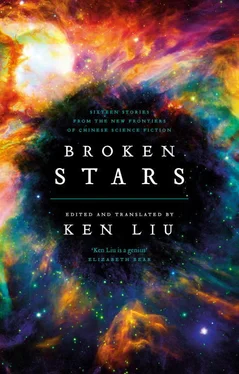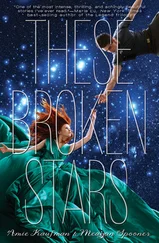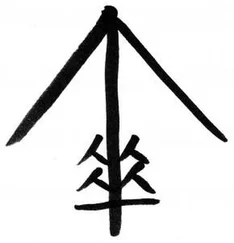Sartre shook his head. “I know that the Chinese once had a philosopher named Zhuangzi. He told this story: If you give a monkey three nuts in the morning and four nuts in the evening, the monkey will be unhappy. But if you give the monkey four nuts in the morning and only three in the evening, the monkey will be ecstatic. In your view, is the monkey foolish?”
“Uh… yes. Zhuangzi’s monkey is a byword for foolishness among the Chinese.”
A mocking glint came into Sartre’s eyes. “But how are we different from the monkey in that story? Are we in pursuit of some ‘correct’ order of history? If you switch happiness and misfortune around in time, will everything appear ‘normal’ to you? If evil exists in history, does it disappear merely by switching the order of events around?”
I felt like I was on the verge of understanding something, but I couldn’t articulate it.
Sartre continued, “ Progress is not a constant. It is merely a temporary phase of this universe. I’m no scientist, but the physicists tell us that the universe expands and then collapses and then expands again, not unlike the cosmic cycles envisioned by your Daoist philosophers. Time could easily flow in another direction… or in one of countless directions. Perhaps events can be arranged in any of a number of different sequences, because time may choose from an infinite set of options. Remember the aphorism of Heraclitus: ‘Time is a child playing dice; the kingly power is a child’s.’
“But so what? Whichever direction time takes, what meaning does all this have? The world exists. Its existence precedes essence because its very existence is steeped in nothingness. It is absurd regardless of the order of the events within it. Perhaps you’re right—had time picked another direction, the universe would be very different: humanity would progress from darkness to light, from sorrow to joy, but such a universe would not be any better. In the end, joy belongs to those who are born in times of joy, and suffering belongs to those born in times of suffering. In the eyes of God, it makes no difference.
“Some say that if war were to break out between the Soviet Union and the United States, the world would end. But I say the apocalypse has long since arrived. It has been with us since the birth of the world, but we have become inured to it by familiarity. The end of the world comes not with the destruction of everything, but with the fact that nothing that happens around us has any meaning. The world has returned to primordial chaos, and we have nothing.”
Sartre stopped, as though expecting me to say something. My mind was utterly confused, and after a long while, I said, “What, then, is the hope for humanity?”
“Hope has always existed and always will,” he said solemnly. “But hope is not the future because time does not have an inevitable direction. Hope is now: in existence itself, in nothingness. The truth of nothingness is freedom. Man has always had the freedom to choose, and this is the only comfort and grace offered to humanity.”
“I understand that’s your theory. But do you really think the freedom to choose belongs to humanity?” My voice grew sharper. “Thirty years ago, I was separated from the woman I loved on the other side of an ocean. Then I returned here. I do not know where she is or whether she is still alive. Can I choose to go find her? A few years back, tens of millions of people died from starvation in this country. If possible, they would all have chosen to survive. But could they have survived? Let me tell you something: many honorable and great men and women chose Communism, believing it would save humanity from suffering, but have you seen the results of their choice? Have you seen what has happened to China? The freedom of mankind is but a fantasy, a cheap consolation. Our state is despair.”
Sartre was silent for a while. Then he said, “Perhaps you’re right. But the meaning of freedom is that you can always choose, though there is no promise that your choice will become reality. Maybe this is a cheap consolation, but other than this, we have nothing.”
I don’t know if I really understood Sartre, or maybe even he couldn’t express himself clearly. He stayed in China for more than a month, and we saw each other often. He said he would try to think about what I said and write a new book, but then he left China and I never saw him again.
15.
The next few years were a golden age for the People’s Republic. The Cultural Revolution was a distant memory, and the later anti-rightist movements were also deemed historical errors. As the cultural sphere grew more animated and open, dissent was tolerated and many different opinions could be voiced. The central leadership adjusted the socialist economic model through new democratic reforms that permitted some measure of private enterprise. The Soviet Union and China entered a honeymoon period, and with Soviet aid, China announced a new five-year plan of full-scale development. Everywhere people were excited and threw themselves into their work with passion. Once again, we began to hope for a better future.
But hope did not last. After the Cuban Missile Crisis, the Cold War heated up again. An American plot overthrew Cuba’s Castro, and the dictator Batista came into power. The Communist forces were driven from the Americas, and then the Korean Peninsula became a new flashpoint. Along the 38th parallel, both sides amassed forces, and war broke out without anybody knowing who had fired the first shot. China could not help but become involved, and young men from China had to go to Korea to fight for the survival of the Republic.
This was the first time in living memory that China and the United States fought directly. The Americans had picked a moment in China’s history when China was at her weakest, when she needed peace and recovery the most. Every sign indicated that China was going to lose. Incredibly, however, the Chinese Volunteers, who possessed nothing except courage, pushed back the American assault and forced the American army to a standstill along the 38th parallel. This was not achieved without great cost. It was said that hundreds of thousands, perhaps even millions, gave their lives. I didn’t know the exact figure, but considering that even Chairman Mao’s son died in battle, one could imagine how desperate and fierce the fighting was.
The war caused the economy to collapse. Prices soared and more hardships were added to people’s lives. Dissatisfaction with the government grew, and a name long forbidden began to surface in conversations: Chiang Kai-shek.
He was a hardened anti-Communist. Although the situation across the Taiwan Strait had long been tense due to the mainland’s overwhelming advantage over the island, Taiwan’s leaders had always pursued a policy of de facto independence, only passively resisting any mainland advances. But twenty years ago, after Chiang Kai-shek came to power, he declared that he would reclaim the mainland. Since the war in Korea had reached a stalemate, the Americans encouraged Chiang to join the conflict. He thus declared his intention to carry out his old promise.
With American support, Taiwan’s fighters and warships encroached upon the mainland coast and pamphlets were dropped in Guangzhou, Shanghai, and other cities. Taiwan’s army entered Burma and harassed the border with China. It was said that parts of Yunnan Province had already fallen to Chiang’s forces. Tibet declared independence and would no longer heed orders from Beijing. Bandits under the flag of the “Nationalist Army” killed and looted the rural countryside. Spies in various cities began to put up anti-Communist posters.
The government responded by cracking down on counterrevolutionaries, but the effects appeared slight. Rumors were rampant and the population grew restless. The central leadership signed a cease-fire with the Americans and pulled the army back into China in an attempt to stabilize the domestic situation.
Читать дальше












